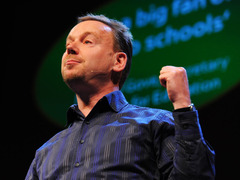With more colleges shifting courses to the online classroom and high school teachers and students alike expressing a strong desire to move away from rigid, mandated lesson arcs, it’s clear — classes don’t have to be exactly as they are. Educators across the globe have begun to look at ways of transforming curriculum to suit different kinds of learners, and to make education more active for all involved. As TED celebrates Education Week, we were inspired to create this playlist all about tweaks to teaching.
 Dan Meyer: Math class needs a makeover
Dan Meyer: Math class needs a makeover
Dan Meyer: Math class needs a makeover
Dan Meyer: Math class needs a makeoverA high-school math teacher, Dan Meyer says the experience of teaching within the set curriculum is like “[selling] a product to a market that doesn’t want it, but is forced by law to buy it.” His students don’t learn how to retain information, but instead, how to decode a textbook. The key, for him, lies in trusting in students’ ability to problem-solve. In this talk from TEDxNYED, he imagines lessons where kids are involved in the formulation of problems. |
 Mae Jemison: Teach arts and sciences together
Mae Jemison on teaching arts and sciences together
Mae Jemison: Teach arts and sciences together
Mae Jemison on teaching arts and sciences togetherAt TED2002, astronaut and designer Mae Jemison points out a false dichotomy: that the arts and sciences are mutually exclusive. In this outdated view, students are either creative or logical. Instead, she says, students need to be treated as both — because their curiosity often leads them to design and physics. Analysis, ingenuity and imagination all stem from our inclination towards creativity, she says. |
 Liz Coleman: A call to reinvent liberal arts education
Liz Coleman’s call to reinvent liberal arts education
Liz Coleman: A call to reinvent liberal arts education
Liz Coleman’s call to reinvent liberal arts educationThe president of Bennington College, Liz Coleman posits at TED2009 that modern liberal arts education pushes students towards a single discipline with an exclusive viewpoint with an aversion to social values. Coleman emphasizes that the responsibility of academics is to empower students instead of deflate them. She stresses the importance of action and self-driven education, and how with them a new liberal arts can emerge. |
 Shimon Schocken: The self-organizing computer course
Shimon Schocken: The self-organizing computer course
Shimon Schocken: The self-organizing computer course
Shimon Schocken: The self-organizing computer courseIn this talk from TEDGlobal 2012, computer science professor Shimon Schocken shares the idea that educators don’t necessarily need to actively teach, but instead can provide an environment for self-learning. In his lessons, he gives his students the tools and guidance to build a computer from the bottom up, giving them ownership over their learning. Seeing the success of this model, Schocken then open-sourced the course online – and saw it take on a life of its own. |
 Geoff Mulgan: A short intro to the Studio School
Geoff Mulgan: A short intro to the Studio School
Geoff Mulgan: A short intro to the Studio School
Geoff Mulgan: A short intro to the Studio SchoolFaced with droves of uninspired dropouts and employers who complained about the new generation’s lack of experience, Geoff Mulgan asked, “What kind of school would have teenagers fighting to get in, not fighting to stay out?” At TEDGlobal 2011, he shares his findings — the simple idea that you learn by working. Thus, the Studio School was created, with pupils getting real world experience in business and the trades, while they contribute to their communities. |
 Tyler DeWitt: Hey science teachers -- make it fun
Tyler DeWitt: Hey science teachers – make it fun
Tyler DeWitt: Hey science teachers -- make it fun
Tyler DeWitt: Hey science teachers – make it funHigh school science teacher Tyler DeWitt had a scary classroom moment – he walked into school excited for a lesson on bacterua, only to find that his class hasn’t understood a lick of the assigned reading. At TEDxBeaconStreet, he calls for science teachers to rethink their lesson plans and ask: do they involve a lot of jargon? Are they so precise that they keep students from getting the basic concepts? More than anything, he asks teachers not to lean on textbooks but to find ways to make science pop to life. |
 Kiran Sethi: Kids, take charge
Kiran Bir Sethi teaches kids to take charge
Kiran Sethi: Kids, take charge
Kiran Bir Sethi teaches kids to take chargeIn schools across India, Kiran Bir Sethi began an experiment: to find out what would happen if you took students out of the classroom and showed them their potential to shift injustice around them. At TEDIndia 2009, Bir Sethi shares the story of children who were taught the importance of literacy and who were inspired to hold a campaign to educate their illiterate parents. By broadening their horizons, these children learned much — and transformed their communities. Takeaway: homework doesn’t have to involve worksheets. |
Comments (5)
Pingback: Curriculum Development & Needs Assessments within that | Instructing Adult Students - Strategies, Technologies & Trends